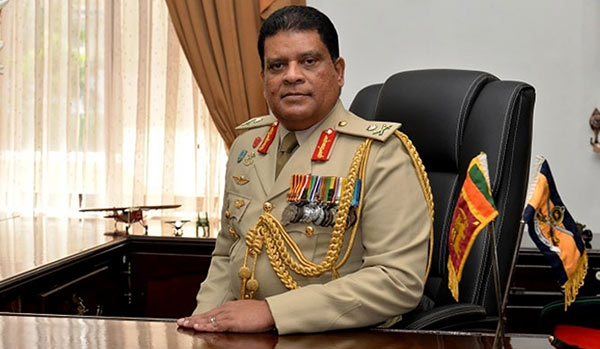US travel ban for Sri Lanka army chief

The United States said Friday it would refuse entry to Sri Lanka’s army chief over what it called credible evidence of human rights violations in the 2009 war against LTTE terrorists.
Lieutenant General Shavendra Silva, whose appointment last year drew widespread international criticism, will be ineligible to visit the United States, as will his immediate family, Secretary of State Mike Pompeo said.
“The allegations of gross human rights violations against Shavendra Silva, documented by the United Nations and other organizations, are serious and credible,” Pompeo said in a statement.
“We urge the Sri Lankan government to promote human rights, hold accountable individuals responsible for war crimes and human rights violations, advance security sector reform, and uphold its other commitments to pursue justice and reconciliation,” he said.
Shavendra Silva was the commanding officer of a key army division in the final months of the war against LTTE terrosists in 2009.
Rights groups charges some 40,000 ethnic Tamils were killed in war as government forces seized Sri Lanka’s predominantly Tamil north. A UN report said Silva played a major role in orchestrating the war crimes.
The Sri Lankan government said it took “strong objection” to the travel ban on Silva and asked the United States to reconsider.
It reiterated its stance that there were “no substantiated or proven allegations of human rights violations against him.”
“It is disappointing that a foreign government should question the prerogative of the democratically elected president to call upon persons with proven expertise to hold key positions on national security related matters,” the government said in a statement.
The 2009 war against LTTE terrorists delivered a death blow to the Tamil Tigers, whose nearly four-decade campaign for a separate homeland had killed 100,000 people and was characterized by rebel suicide attacks.
Message to other post-war states
Kate Cronin-Furman, an expert on mass atrocities and human rights at University College London (UCL), said a visa ban would be a “pretty small disincentive” if seeking to stop ongoing atrocities.
“But if instead we think about this as an effort to get states like Sri Lanka to stop appointing war criminals to leadership positions, then the prospects look much rosier,” she said.
Other nations’ post-war governments, seeing the visa ban on Silva, could conclude it is easiest “to just not promote a war criminal in the first place.”
The Sri Lankan government “will likely get some domestic political mileage out of Shavendra Silva’s visa ban. But there’s no doubt that it’s embarrassing to have your army commander barred from entering the US,” she said.
The Tamil diaspora in the United States has been active in pressing for action by President Donald Trump’s administration, which has often been low-key in addressing human rights with friendly countries.
The action comes despite US efforts to woo Sri Lanka away from China, which has lavished money on the strategically placed island traditionally allied with nearby India and in 2017 assumed control of a port after the Colombo government could not repay loans.
A State Department spokesperson said that the visa sanction against Silva “does not place additional restrictions on security assistance or military engagement in Sri Lanka.”
In 2017, the United States provided $39 million to Sri Lanka to boost maritime security. The United States has also looked to step up counter-terrorism cooperation with Sri Lanka after last year’s Easter Sunday bombings carried out by Islamist extremists.
“We deeply value our partnership with the Sri Lankan government and the long-standing democratic tradition we share with the Sri Lankan people,” Pompeo said.
(With inputs from AFP)

Latest Headlines in Sri Lanka
- COPE uncovers irregular NMRA certification process March 14, 2025
- Anuradhapura Hospital Director removed following doctor’s assault March 14, 2025
- Popular rapper Shan Putha arrested with firearm March 14, 2025
- Batalanda commission report tabled in Sri Lankan Parliament March 14, 2025
- Female Grama Niladharis withdraw from night duty over security concerns March 14, 2025



What is the big deal? He already told he doesn’t have any intention to got USA.
These are our heroes They fought for our course defeating the cowered barbaric Tamil paper tigers. This so called yahaplanaya created for the political gain of that pabaya Sirisena and senile Ranil pull down the moral of our brave solders. They gave so much to Tamils and other minorities at the cost of Sinhalese and gave the impression to the world that we Sinhalese are the trouble makers and cause of all this trouble and Tamils are saints. That is the impression I get when I travel around the western world. That Ranil and Sirisena got lot to answer to me.
Agreed Mr Ranjith. Add Mangala to the list. Collectively, these politicians, and others have not been true advocates of our country, which is utterly disgraceful, given the power, and privilege they command whilst in office.
Instead, they have painted a very bleak picture to the global community. Falsely accusing the Sinhala majority, when in fact, majorities of other countries would not, and do not, tolerate what we have had to go through with the aggressive stance and demands made by minority politicians.
Meanwhile, Tamil activists here and abroad continue relentlessly to discredit our country in order to promote their cause, and their lobbying has been effective enough to influence foreign governments.
What can we do now?
Hopefully, the present government will address the shortcomings of the previous government.
A good starting point would be to review Lord Naseby’s report which refutes the 40,000 civilian deaths, suggests a much smaller number, stresses the difficulty in distinguishing between civilians and LTTE since uniforms were shed, and foreign army observers have not discredited our army’s actions.
Moreover, our high commissions need to act appropriately and timely, and we, as individuals, should make every effort to dispel the created myths, and educate the international community. Only then, will we stand a chance.